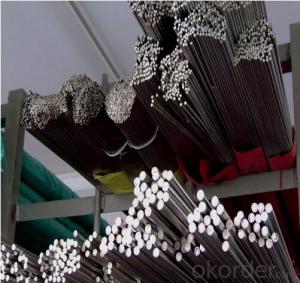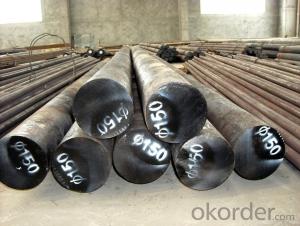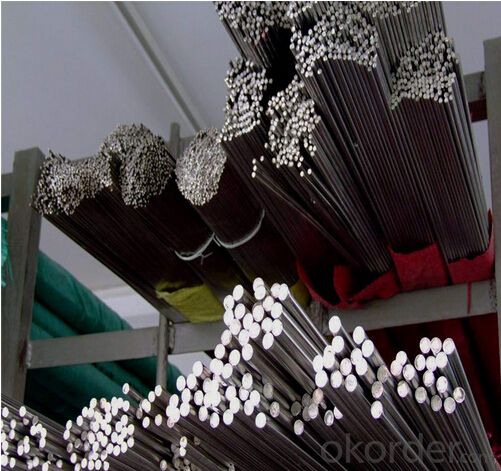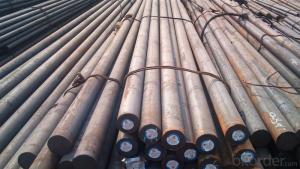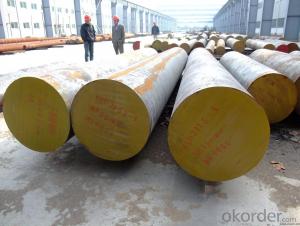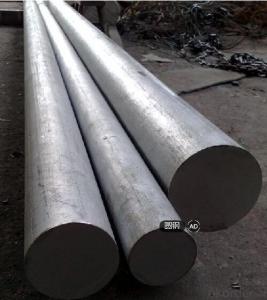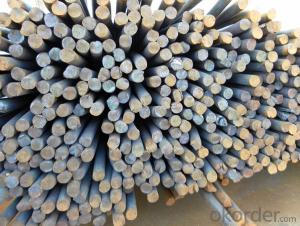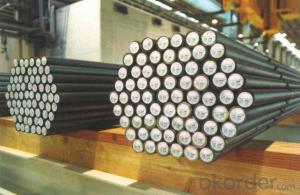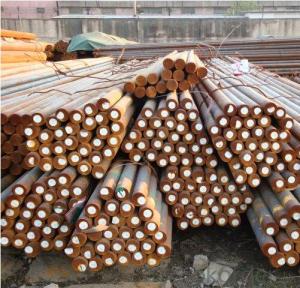Tool Steel SKD10,Cr12Mo1V1, D2,1.2379,2379 Steel Round Bar
- Loading Port:
- China main port
- Payment Terms:
- TT OR LC
- Min Order Qty:
- 25 m.t.
- Supply Capability:
- 10000 m.t./month
OKorder Service Pledge
OKorder Financial Service
You Might Also Like
Specification
The details of our Steel
1. Produce Standard: as the GB, AISI, ASTM, SAE, EN, BS, DIN, JIS Industry Standard
2. Produce processes: Smelt Iron -EAF smelt Billet - ESR smelt Billet -Hot rolled or forged get the steel round bar and plate
3. Heat treatment:
Normalized / Annealed / Quenched+Tempered
4. Quality assurance:
All order we can received Third party inspection, You can let SGS, BV,.. and others test company test and inspect our products before Goods shipping.
Product information
1.ChemicalComposition(%) | CSiMnCrMoVPS1.40-1.60≤0.40≤0.60≥11≥0.8≥0.2≤0.030≤0.030
|
2.Equivalent Grades | SKD10/ D2/ 1.2379 |
3.Form&Size | 1)1.2379 Tool Steel round bars, flat/square bars,plates,sheets. |
2)DIN 1.2379 Tool Steel Size Available(Length can be customized)
| |
4.Round bar | Diameter (mm) Length (mm) Round bar: 12~50 x 2000~5800 Hot rolled |
5.Flat bar | Thickness(mm) Width(mm) Length (mm) |
6.Surface Condition | 1)Black,Peeled,Turned,Grinded; 2)D2 die steel should be free of heavy scale,deep pitting,laps,porosity,injurious segregations,excessive nonmetallic inclusions,seams,cracks,slivers,scale marks,dents,soft and hard spots,pipes or any defects that would detrimentally affect the suitability of 1.2379 mold steel. 3)Visual examination for D2 mould steel shall be made to ensure compliance with the requirements for workmanship,finish,dimensions and tolerances,identification marking and packaging. |
7.Straightness | The permissible deviation of 1.2379 tool steel shall not exceed 3mm in 1000mm length.This applies also to bars under 1000mm in length.Measurement is taken on the concave side of D2 steel with a straight edge. |
8.Hardness | AISI 1.2379 tool steel annealed hardness values when obtained in accordance with the latest issue of test methods and definitions A370 shall not exceed 255 Brinell. |
9.HeatTreatment | Annealing |
Hardening | |
Tempering | |
10. Other Tool Steel and Mould Steel grade |
D3/1.2080/X120Cr12, D2/1.2379, SKD11, H13/1.2344, H11/1.2343/4X5MΦC, H21/1.2581, Cr12MoV/ X12MΦ, O1, O2, A2, P20, 1.2714, M2, M3, T1, 4Cr13/40X13, 2Cr13, 9Cr18, DC53, NAK80 etc. |
Product show

Workshop show

- Q: What are the different coating materials used for special steel?
- There are several different coating materials used for special steel, including zinc, aluminum, nickel, tin, and epoxy-based coatings. These coatings are applied to enhance the corrosion resistance, improve durability, and provide a decorative finish to the special steel.
- Q: How does special steel perform in terms of corrosion resistance in marine environments?
- Special steel alloys, specifically designed for marine environments, exhibit excellent corrosion resistance. Due to their higher levels of alloying elements like chromium, nickel, and molybdenum, these steels form a protective oxide layer that prevents rusting and pitting, even when exposed to saltwater and other harsh marine conditions. Their exceptional corrosion resistance ensures prolonged durability, reduced maintenance, and enhanced performance in marine environments.
- Q: What are the properties of free-cutting steel?
- Free-cutting steel is characterized by its high machinability, which means it can be easily and efficiently machined into various shapes and sizes. It has excellent chip breaking properties, resulting in reduced tool wear and improved surface finish during machining operations. Free-cutting steel also has good formability, allowing it to be easily shaped and fabricated. Additionally, it exhibits high strength and good corrosion resistance, making it suitable for a wide range of applications in industries such as automotive, aerospace, and machinery manufacturing.
- Q: Can special steel be used for making springs?
- Indeed, springs can be crafted using special steel. Recognized as alloy steel, special steel possesses augmented mechanical attributes like impressive tensile strength, toughness, and resistance against corrosion. Consequently, it serves as an optimal substance for the production of robust and dependable springs across diverse applications. The precise variant of special steel employed in spring production hinges upon the particular necessities of the application, be it a desired degree of flexibility or resistance against fatigue. All in all, special steel bestows extraordinary performance and endurance in the realm of spring manufacturing.
- Q: How does special steel contribute to the food processing industry?
- Special steel contributes to the food processing industry by providing high-quality and durable materials for the production of equipment and machinery. The unique properties of special steel, such as corrosion resistance, heat resistance, and hygiene, ensure that the food processing industry can maintain strict standards of cleanliness and efficiency. This type of steel is used in various applications, including cutting, grinding, and packaging, ultimately enhancing the safety, productivity, and longevity of food processing operations.
- Q: What are the main factors affecting the creep rupture strength of special steel?
- The main factors affecting the creep rupture strength of special steel are the material composition, grain size, temperature, applied stress, and time.
- Q: How does special steel meet the requirements of specific industries?
- Special steel meets the requirements of specific industries by offering exceptional strength, durability, and resistance to corrosion, heat, and wear. Its unique composition and manufacturing process allow it to withstand extreme conditions and perform efficiently in diverse applications such as automotive, aerospace, energy, construction, and manufacturing. Additionally, special steel can be tailored to meet the specific needs of each industry, ensuring optimal performance and reliability in their respective operations.
- Q: What are the properties of wear-resistant alloy steel?
- Wear-resistant alloy steel possesses several key properties, including high hardness, excellent toughness, and superior resistance to abrasion, impact, and wear. It is designed to withstand harsh conditions and maintain its structural integrity even when subjected to repeated friction and contact with hard surfaces. Additionally, these alloys often feature a high level of corrosion resistance, making them suitable for various applications in industries such as mining, construction, and manufacturing.
- Q: Can special steel be used in corrosive environments?
- Yes, special steel can be used in corrosive environments. Special types of steel, such as stainless steel or corrosion-resistant alloys, are designed to withstand corrosion caused by exposure to moisture, chemicals, or other corrosive elements. These materials have a higher resistance to rust and corrosion, making them suitable for applications in corrosive environments like marine environments, chemical plants, or oil and gas facilities.
- Q: How does sulfur affect the machinability of special steel?
- Sulfur negatively affects the machinability of special steel by forming brittle sulfide inclusions, reducing the steel's ability to be cut, drilled, or shaped effectively.
Send your message to us
Tool Steel SKD10,Cr12Mo1V1, D2,1.2379,2379 Steel Round Bar
- Loading Port:
- China main port
- Payment Terms:
- TT OR LC
- Min Order Qty:
- 25 m.t.
- Supply Capability:
- 10000 m.t./month
OKorder Service Pledge
OKorder Financial Service
Similar products
Hot products
Hot Searches
Related keywords
